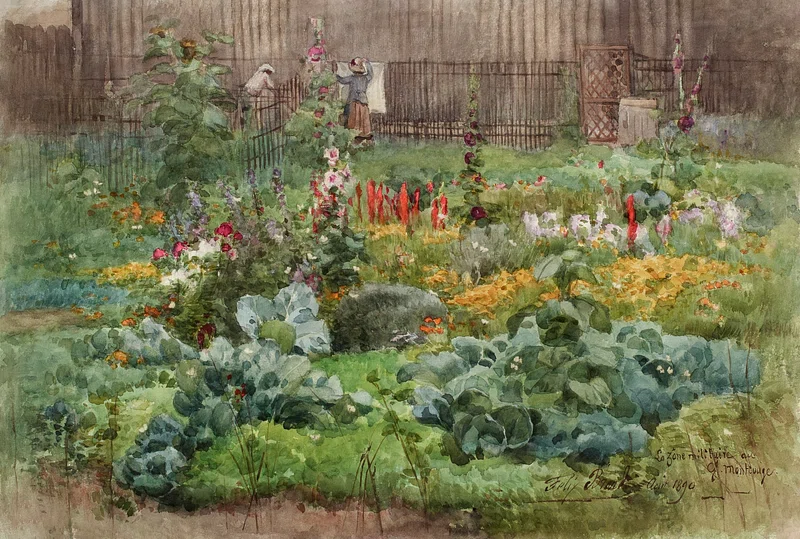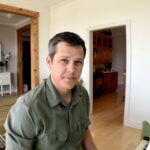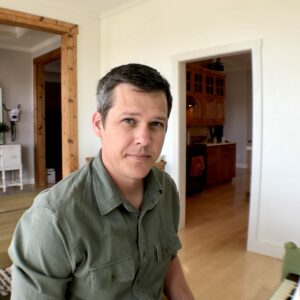A few years ago, I visited Matthew Miller at his home outside of Branson, Missouri. Initially, I had invited him to meet at a coffee shop so we could get to know one another, but he replied, “I make a better cup of coffee than anything you’re going to get in Branson, so just come over.” That’s a bold statement, but then you meet Matt. He resists being a passive consumer. If he drinks coffee—maybe the most passively consumed commodity on the planet—he’s going to order the raw beans wholesale, blend them, roast them, grind them, and brew them. If coffee trees could possibly be grown in Missouri, he’d cultivate them and wait 10 years for production so he could enjoy a cup of coffee. So, on an early March morning, while we both sipped the best cups of coffee that could be found in the Ozarks, Matt walked me around the property that is the setting of his new book Leaves of Healing: A Year in the Garden out now from Belle Point Press. He described where the water drained across the slope of his land and into the woods below his house. Then he pointed over those woods where the bald ridge of a low mountain hung in the morning haze and explained how the mid-century logging industry had cleared all of the old growth forests in Missouri. He nudged limestone rocks from the thawing March mud with the toe of his boot and caressed leafless fruit trees to see if any tenderness of spring sap was rising. Although his primary vocation is as a writing professor at College of the Ozarks—a “working” college that serves students from the region—his book of essays grew out of his efforts to live and work his suburban plot in the margins of an otherwise full life. As the book’s subtitle suggests, the essays recount a year in his garden, following both the church’s liturgical calendar and the growing calendar of the garden. We emailed the following conversation over several days just before Christmas.
Seth Wieck: In a well-organized gardening shed, one can see the shape, design, and likely the work intended for each tool. Shears are clearly not a spade. Books unfortunately all have the same shape. However, books are tools for thinking, and readers should read and utilize each book for the work intended. Leaves of Healing is a special kind of tool. Each essay is equal parts gardening manual, natural history, memoir, sometimes even a devotional. How did you arrive at these forms of essay? If an essay is a tool for thinking, what work were you trying to accomplish?
Matthew Miller: Selection of a form is always such an interesting problem for an essayist, because of all the major literary forms (poetry, fiction, drama, essay), the essay has perhaps the fewest formal constraints. It’s a protean, multiple, even formless form of writing. Even when you see writers like John McPhee imposing more of a structure on an essay, it remains the prerogative of the essayist to range widely across genres and subject matters.
As a reader, I’m always looking for writers who confront me with the Real. I like writing that looks outward as much as it looks in. So to an extent, the blend of subject matters and genres I explore in these essays just reflected my general method of using the garden and the liturgy as means to look out at the world. I stumbled my way, as it were, into natural history and art criticism and memoir and whatever else through looking hard at my surroundings. The work I most wanted to do was to look at those things that were especially central to my life and to see what other vistas they would open up, just through giving them close attention.
It might also be worth talking about the form of the book as a whole. The essays it contains were written to be free-standing, but my intention was always to write my way up to a book that would traverse a whole year. And that form itself pushed me to think about certain things. I didn’t expect the lead idea of the book to be a rumination upon time—but when you set out to write a book about the seasons, I guess you shouldn’t be surprised if the form pushes you in that direction. So the book’s structure as a garden journal helped me think about something that I didn’t realize in advance that I needed to think about.
Seth Wieck: Calendars—the tools we use for marking time’s passage— are a major theme of your book. Each chapter in Leaves of Healing bounces between the gardening calendar and the liturgical calendar. The longer I’ve been away from my family’s farm, I find myself becoming insulated from these markers of time and seasons; I’m more accustomed to the calendars of candy aisles and holiday decorations. What do you find in the gardening and liturgical calendars that are more helpful than what the culture at large offers us?
Matthew Miller: Our accustomed calendars are commercial in nature. I used to work in marketing; what a calendar is for, from a marketer’s point of view, is to direct our attention (and thereby our desires) to products for sale. Our relationship to time thus becomes structured by what we buy. If we want to be something more than a consumer, we need some other calendars to organize our days and times. So in part, I value the garden and liturgical calendars because they give me a different sense of my identity and the organization of my time—they don’t reduce me to a consumer. But it’s also important to talk about what these calendars offer us in their particularity.
The garden calendar is a means of paying close, technical attention to what’s going on around you. When you think about your year in light of the garden, you have to think about the length of the days, weather patterns, average first and last frost dates, amounts of precipitation, and so on. Our creature comforts insulate us from these aspects of nature, since we can always flip a switch and turn on an electric light or a blast of cool air. When we pay attention to the garden year, we pay attention to nature in a way that modern people can easily miss.
The liturgical calendar invites us to pay attention in a different way. Because it follows the life of Christ, it’s an invitation to structure our works and days around the rhythms of Christ’s perfect life. As we live out our years in light of that story, we will fast and feast, suffer and rejoice, reflect and act. So it gives us room for our full humanity, where the commercial calendar reduces us to our lives as consumers.
Seth Wieck: You spoke of attention to time, now let’s talk about attention to place, especially given that you’re a transplant from the plains of Nebraska to the Missouri Ozarks. These essays are entirely set on the little suburban plot of land to which you give painstaking attention for one year. Do you think the specific time in your project allowed you to know your adopted place better? Do you think the attention to your little plot changed your affection for the place?
Matthew Miller: Unquestionably, writing the book helped me understand my place better. Gardening itself would have done that, but in writing about the garden and paying it that concentrated attention over a short period, I had to give names to things in a way that gardening alone wouldn’t require. I know things about the geography and the biology and the history of the Ozarks that I wouldn’t know without having written the book.
Knowledge is a path to love, and so I’m bound to say that the book did change my affection for the place. But that’s complicated. Readers of the book will know that at the end of its garden year, my family began preparing to leave that home and garden; as of this writing, we are six months gone, moved into town closer to my job and our community. As the book alludes to, we ended up feeling quite isolated for much of the six years we lived in that home, and the day we left it was actually a huge relief. My affection for the garden and the plants we cultivated there remains, and I think the book helped me preserve that affection. But even the work of writing and paying attention doesn’t get you around some of the basic human needs for community, free time, and margin. For that reason, I’ll always be grateful to have cared for that garden for a season, but also grateful not to be living there anymore. So my affection for that particular plot and town will always be qualified by struggle. I’m still living in hope that I can learn a greater affection for the region—I’m still in the Ozarks—and I do hope that the book can be a starting point in that tutelage.
Seth Wieck: Thank you for writing the book and for the conversation. I think I’ll keep your book next to the seed catalogue while I’m dreaming about this year’s garden.
Image Via: Rawpixel







